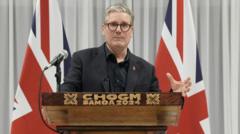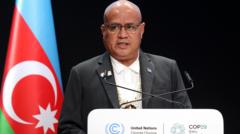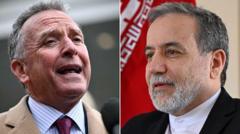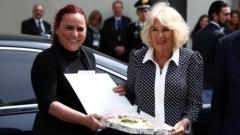**Despite the UK's firm stance against financial reparations, Commonwealth heads signal the need for ongoing discussions about historical injustices.**
**Commonwealth Leaders Urge for Reparations Discussion Despite UK Resistance**

**Commonwealth Leaders Urge for Reparations Discussion Despite UK Resistance**
**Calls for meaningful dialogue on reparations for slavery gain traction at Commonwealth summit in Samoa.**
Commonwealth leaders have marked a significant step toward addressing the legacy of slavery, agreeing that the "time has come" for a dialogue on reparations during their recent summit held in Samoa. This comes despite the UK government's intention to sidestep this contentious issue, as outlined in a document endorsed by 56 heads of government, which included UK Prime Minister Sir Keir Starmer.
The statement acknowledges the necessity for "discussions on reparatory justice" regarding the "abhorrent" transatlantic slave trade, suggesting a demand for a conversation that is "meaningful, truthful, and respectful." While Sir Keir Starmer emphasized that financial discussions were not a focal point of the meeting, calls for reparations have been increasingly persistent from other Commonwealth leaders. The UK has faced mounting pressure to issue both an apology and reparative measures related to its historical involvement in this grave injustice.
In remarks made to the press, Prime Minister Starmer downplayed the reparations topic as merely a subset of the overall summit discussions, which largely centered around resilience and climate issues. "The reparations section is just one paragraph in a lengthy declaration of over twenty paragraphs," he stated, reiterating that "none of the discussions have been about money."
Prior to this summit, UK officials made it clear that the subject of reparations would not be included in the talks, a position reiterated by Chancellor Rachel Reeves, who asserted that the UK would not pursue reparations for slavery. However, the ongoing dialogue within the Commonwealth appears poised to keep the issue in the spotlight, with future discussions anticipated at the upcoming UK-Caribbean forum set for March in London.
Frederick Mitchell, the foreign minister of the Bahamas, expressed hopes that this forum will result in a "comprehensive report" on reparative measures, suggesting an optimistic outlook toward financial recompense from the UK to Caribbean nations. The growing consensus among leaders indicates that reparatory justice—including formal apologies, educational programs, and public health support—could play a central role in future Commonwealth summits.
Newly appointed Commonwealth Secretary-General Shirley Ayorkor Botchwey has also voiced support for reparations, acknowledging the challenging work ahead to address these issues. As discussions evolve, Commonwealth leaders continue to navigate the complex history of slavery, striving toward justice while managing differing expectations regarding reparative actions moving forward.





















